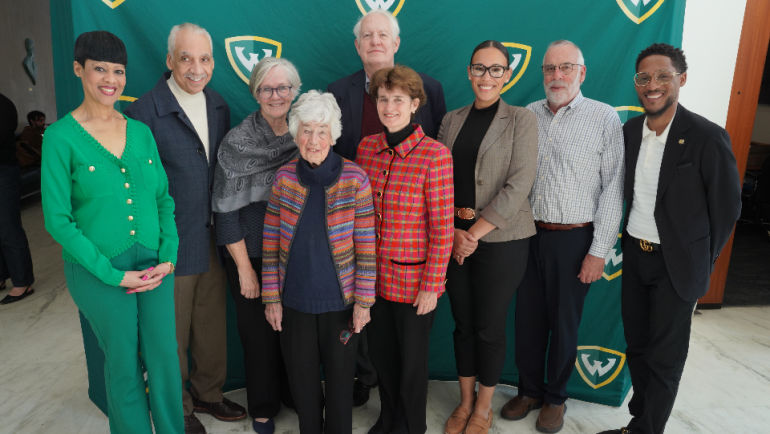
Wayne State University became a hub for housing activism as it hosted the Richard C. Van Dusen Urban Leadership Forum at the McGregor Conference Center last week. The event brought together philanthropists, academics, policymakers and affordable-housing advocates for a daylong session dedicated to broadening home repair programs in Detroit and other cities.
Held for the first time since 2018, the March 27 forum — named in honor of late federal housing undersecretary and former WSU governor Richard C. Van Dusen — sponsored a “Home Repair Solutions Lab” that highlighted the growing need for affordable housing in urban centers and explored strategies for investing in the repair and upkeep of existing homes over the continual construction of new housing.
“As Michigan's only public, urban research university, Wayne State is honored to host the Richard C. Van Dusen Urban Leadership Forum,” said Patrick O. Lindsey, vice president of community relations at Wayne State. “The forum serves as a space for thought leaders and subject matter experts to collaborate on issues impacting our community. We appreciate the Van Dusen family’s entrusting this important work to Wayne State.”
Amanda Van Dusen, an attorney and the daughter of Richard Van Dusen, said her family supports the forum out of a desire to see Detroit continue to blossom. “My father cared deeply about making Detroit a successful city, successful not just for business, but for the residents of the city,” Van Dusen said. “And while the forum doesn't focus just on housing, we are focusing on housing now because of the challenges we face. My dad was undersecretary of the Department of Housing and Urban Development and learned firsthand about the challenges we face across our cities.”
Along with a series of panel discussions and work groups, the forum featured a keynote address from Todd Swanstrom, Ph.D., the Des Lee Professor of Community Collaboration and Public Policy Administration at the University of Missouri-St. Louis, about the need to update and streamline home repair programs, especially those sponsored by government.
“I’m part of a national network that is trying to improve and expand the home repair system,” Swanstrom explained. “So my talk was about how we need to frame the issue of home repair so that it's understood that this is not just some charitable function. Rather, we are central to the future of American cities, central to society as a whole.”
Swanstrom said that home repair efforts are often slowed by bureaucratic inefficiency and a lack of uniformity in processes. He pointed out that these issues often make it difficult for homeowners, particularly those in working-class urban neighborhoods, to access the money they need to fix their property.
“We have such a fragmented set of federal policies that it's confusing to the citizens out there who need home repairs,” he said. “And it's also burdensome to the providers.”
While it’s difficult to quantify exactly how many homeowners locally or nationwide are impacted by the issues, Swanstrom explained that the home repair problems are endemic to most major cities and can pose real danger to residents.
“All lower-income folks probably suffer from some degree of home repair issues,” he said. “They may not even be aware of them. The example might be dampness behind a wall that causes mold, which causes asthma, which causes their children to have to go to the emergency room, which causes their children to miss school. Another big issue is air conditioning. I mean, in the past we haven't viewed air conditioning as a necessity. We viewed it as a luxury, but it’s become a necessity because of global warming and heat, urban heat island effects, and things like this. In St. Louis, I figure that somewhere between 10 and 25% of all the older homeowners lack adequate air conditioning — and the next time there's a heat wave, some of them will die. It's just that simple.”
Forum attendee Heather Zygmontowicz, a senior housing advisor for the City of Detroit, said the gathering offered a great opportunity for advocates to network and share strategies for better funding and administering home repair efforts.
“We know we need to get more money, but no matter how much money we have to administer home repair, we have to do it effectively,” Zygmontowicz said. “And that's really what we're getting at is how we can work better together.”
The event — which was presented in partnership with the Coalition for Home Repair, Enterprise, and The Gilbert Family Foundation — marked the return of the leadership forum after a five-year absence. The forum evolved out of the Richard C. Van Dusen Visiting Professorship in Urban Leadership, which was established at WSU in March 1992 with an endowment from the Van Dusen family. In 2021, Barbara C. Van Dusen, as the current representative of the Van Dusen family and Wayne State, agreed to broaden the endowment’s reach by transforming it to operate as the Richard C. Van Dusen Urban Leadership Forum Endowed Support Fund in the Office of Government and Community Affairs.
